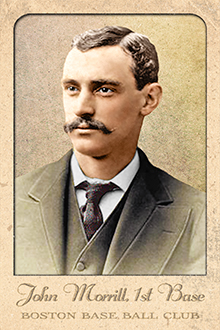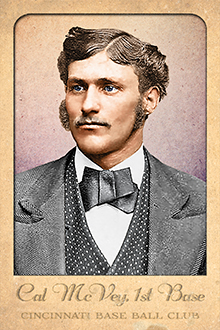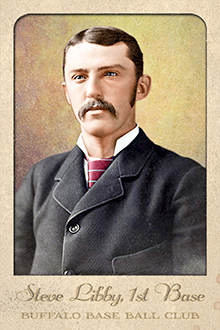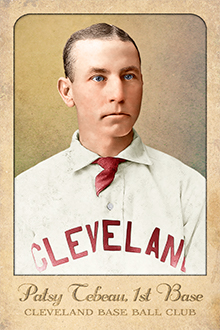
- Series: Pioneer Portraits II: 1875-1899
- City: Cleveland
- Team: Spiders
- League: National League
Oliver Wendell Tebeau (1864-1918) played first and third-base for five ML teams from 1887-1900. He was player-manager for three of those clubs 11 of his 13 seasons, squaring off with his arch-rival John McGraw and his Orioles. Tebeau led Cleveland during the rough-and-tumble era closing the 19th century. His obituary said he belonged to “the blood and iron brigade of baseball.” It was said that when the Spiders and Orioles met, “wild war raged up and down the field.” The august founding father of the game, Henry Chadwick, wrote in 1896 that Tebeau “degraded the game more than any player of the previous quarter century.” But the Cleveland fans loved Patsy and the League’s attempts to silence him soon faded.
- After retiring from the diamond, Tebeau ran a successful saloon in St. Louis
- Patsy couldn’t endure his wife’s decision to leave him and take the kids back to Cleveland. After his death at his own hand the local paper headlined: “Patsy Tebeau Acts as His Own Umpire”
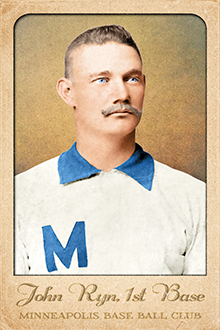
- Series: Pioneer Portraits II: 1875-1899
- City: Minneapolis
- Team: Millers
- League: Western Association
John Ryn (1862-1928) came out of Ohio and the Ohio Institute for the Education of the Deaf and Dumb, a nursery of some of the great baseball talent of the 1870s and 80s. A teammate of William Hoy and Edward Dundon, Ryn never followed them into the majors but floated on the periphery of the big leagues from 1884 to ‘95. The strapping first baseman had power and character but injuries and bad timing conspired to keep him in the minors. Hearing-impaired players made a significant imprint on the early game, none more so than Hoy, the “King of the Mutes” in the benighted lingo of sports scribes then. Ryn was able to carve out a pro career that spanned a dozen teams ending with the Twin Cities Hustlers of the Interstate League. The sketchy data indicate a .270 overall BA but press coverage consistently portrayed Ryn as a man to be reckoned with on the diamond.
- John and his sisters were deaf, their parents were not. A lifelong bachelor, Ryn made a living as a manual laborer and lived out his life with sister Anna in Marion OH
- Series: Pioneer Portraits II: 1875-1899
- City: Boston
- Team: Beaneaters
- League: National League
John Francis Morrill (1855-1932) was a successful player/manager, primarily for the Beaneaters, in a career spanning 1876-90. His team’s third pennant came in ’83, the year after he took over as manager at Boston. “Honest John” hit .319, played six positions, and piloted the club to victory, winning 33 of its final 44 games.
- Batted .260 over his 15 year career
- Received a 5-minute ovation upon his return to Boston after a brief stint w/Washington
- Series: Pioneer Portraits II: 1875-1899
- City: Cincinnati
- Team: Reds (NL)
- League: National League
Calvin Alexander McVey (1849-1926) was a key player in the earliest days of pro ball, first with Harry Wright’s seminal Cincinnati Red Stockings in 1869, then moving with Wright to Boston as one of Harry’s select threesome. The young McVey joined the fledgling pro team for a stagecoach trip to Omaha and then became the 1st ball club to use the new transcontinental railroad to SF as part of the Red Stocking’s national tour.
- During his career, McVey played all nine positions and was an outstanding hitter: .346 BA lifetime
- McVey’s move from Boston to Chicago in 1876 with Al Spalding, Ross Barnes & Deacon White (to form the White Stockings with Cap Anson, Paul Hines & Bob Addy) led to the creation of the NL
- Series: Pioneer Portraits II: 1875-1899
- City: Buffalo
- Team: Bisons
- League: National League
Stephen Augustus Libby (1853-1935) played one game for the Buffalo Bisons of the National League on May 10, 1879. His first game was also his last. Libby went on to umpire one game that year and eight more in 1880 behind the plate.
- Libby played 1B, handling 8 chances without an error
- Not as successful at the plate, Libby was 0-2 with a lifetime .000 BA


